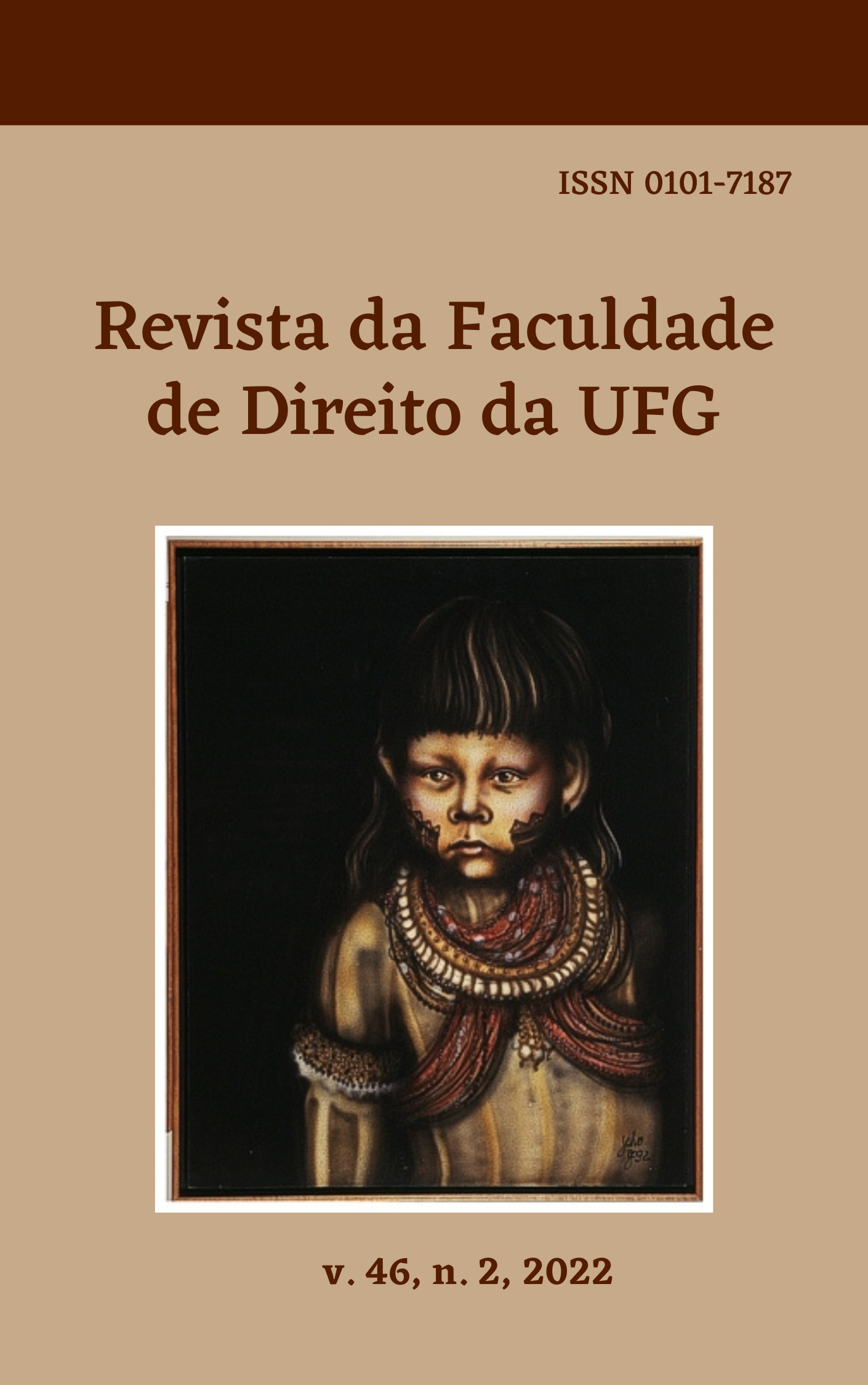BRAZILIAN POLICIES ON GENDER VIOLENCE
BIOPOLITICS AND CRIMINAL MEASURES
DOI:
https://doi.org/10.5216/rfd.v46i2.66877Keywords:
Gender equality, Criminal policies, BiopoliticsAbstract
The article aims to provide a descriptive synthesis of the research I conducted in 2019 on Brazilian criminal measures aimed at combating gender violence. These polls were first presented at two national events which I attended as a guest speaker; and have been revised based on questions posed to me at the events by the participating audience. The research focuses on gender violence and seeks to ask: (a) what are the current gender policies in Brazil and who is the main subject of these gender policies?; and b) considering violence as one of the main obstacles to the development of gender equality, are measures to reduce violence producing the desired results? The research was carried out by deductive method, with a bibliographic, documentary and legislative technique.
Downloads
References
BENEVIDES, Bruna; SIMPSON, Keila. Mapa dos assassinatos de travestis e transexuais no Brasil em 2017. Brasil: Antra, 2018.
BENEVIDES, Bruna; NOGUEIRA, Sayonara Naider Bonfim. Dossiê Assassinatos e violência contra travestis e transexuais no Brasil em 2018. Brasil: Antra, 2019.
BENTO, Berenice Alves de Melo. Brasil: o país do transfeminicídio. CLAM, Rio de Janeiro, 2014.
BRASIL. Plano nacional de políticas para as mulheres. 2005. Disponible à: <http://bvsms.saude.gov.br/bvs/publicacoes/pnpm_compacta.pdf>. Accès à 15/05/2019.
BRASIL. Lei 11.340 – Lei Maria da Penha. 2006. Disponible à: <http://www.planalto.gov.br/ccivil_03/_ato2004-2006/2006/lei/l11340.htm>. Accès à 15/05/2019.
BRASIL. II Plano nacional de políticas para as mulheres. 2008. Disponible à: <http://portal.mec.gov.br/dmdocuments/planonacional_politicamulheres.pdf>. Accès à 15/05/2019.
BRASIL. Plano nacional de promoção da cidadania e dos direitos humanos de LGBT. 2009. Disponible à: <http://www.dhnet.org.br/dados/pp/a_pdfdht/plano_nacional_lgbt_2009.pdf>. Accès à 15/05/2019.
BRASIL. Pacto nacional pelo enfrentamento à violência contra mulheres. 2010. Disponible à: <https://www12.senado.leg.br/institucional/omv/entenda-a-violencia/pdfs/pacto-nacional-pelo-enfrentamento-a-violencia-contra-as-mulheres>. Accès à 15/05/2019.
BRASIL. Lei n. 13.104. 2015. Disponible à: <http://www.planalto.gov.br/ccivil_03/_Ato2015-2018/2015/Lei/L13104.htm>. Accès à 15/05/2019.
BRASIL. Lei n. 11.827. 2019. Disponible à: <http://www.planalto.gov.br/ccivil_03/_ato2019-2022/2019/lei/L13827.htm>. Accès à 15/05/2019.
BUTLER, Judith. Problemas de gênero: feminismo e subversão da identidade. Rio de Janeiro: Civilização Brasileira, 2003.
BUTLER, Judith. Quadros de guerra: quando a vida é passível de luto? Rio de Janeiro: Civilização Brasileira, 2015.
FLORES, Maria Bernadete Ramos. Medicalização do sexo. In: Tecnologia e Estética do Racismo. Chapecó: Argos, 2005.
FOUCAULT, Michel. Em defesa da sociedade – curso no Collège de France. São Paulo: Martins Fontes, 2005.
FUNDAÇÃO PERSEU ABRAMO. Violência doméstica e violência de gênero. 2011. Disponible à: <https://fpabramo.org.br/2011/02/11/violencia-domestica/>. Accès à 15/05/2019.
IBGE. Estatísticas de gênero: indicadores sociais as mulheres no Brasil. 2018. Disponible à: <https://biblioteca.ibge.gov.br/visualizacao/livros/liv101551_informativo.pdf>. Accès à 15/05/2019.
LIMA, Renato Sérgio de; BUENO, Samira. Anuário Brasileiro de Segurança Pública 2017. São Paulo: Fórum Brasileiro de Segurança Pública, 2017.
LIMA, Renato Sérgio de; BUENO, Samira. Anuário Brasileiro de Segurança Pública 2018. São Paulo: Fórum Brasileiro de Segurança Pública, 2018.
OEA. Convenção Interamericana para prevenir, punir e erradicar a violência contra a mulher – Convenção de Belém do Pará. 1994. Disponible à: <http://www.cidh.org/Basicos/Portugues/m.Belem.do.Para.htm>. Accès à 15/05/2019.
UNITED NATIONS. Charter of United Nations. 1945. Disponible à: http://www.un.org/en/documents/charter/. Accès à 15/05/2019.
UNITED NATIONS. The universal declaration of human rights. 1948. Disponible à: http://www.un.org/en/documents/udhr/. Accès à 15/05/2019.
UNITED NATIONS. Convention of the elimination of all forms of discrimination against women. 1979. Disponible à: http://www.ohchr.org/EN/ProfessionalInterest/Pages/CEDAW.aspx. Accès à 15/05/2019.
UNITED NATIONS. Human development report 1990. New York: Oxford University Press, 1990.
UNITED NATIONS. Human development report 1995. New York: Oxford University Press, 1995.
UNITED NATIONS. Human development report 1997. New York: Oxford University Press, 1997.
UNITED NATIONS. The future we want (A/CONFIT.216/L.1*). 2012. Disponible à: <http://www.rio20.gov.br/documentos/documentos-da-conferencia/o-futuro-que-queremos/at_download/the-future-we-want.pdf>. Accès à 15/05/2019.
UNITED NATIONS. Transformando o mundo: a agenda 2030 para o desenvolvimento sustentável. Rio de Janeiro, 2015. Disponible à: <https://sustainabledevelopment.un.org>. Accès à 15/05/2019.
UNITED NATIONS. Human development report 2016: human development for everyone. New York: UNPD, 2016.
UNITED NATIONS. Resolution adopted by the Human Rights Council on 30 june 2016: Protection against violence and discrimination based on sexual orientation and gender identity. 2016. Disponible à: <https://www.un.org/en/ga/search/view_doc.asp?symbol=A/HRC/RES/32/2>. Accès à 15/05/2019.
UNITED NATIONS. Human development report 2018: human development indices and indicators. New York: UNPD, 2018.
WAISELFISZ, Julio Jacobo. Mapa da violência 2015: homicídio de mulheres no Brasil. Brasil: FLACSO, 2015.
Downloads
Published
How to Cite
Issue
Section
License
Os Autores que publicam nesta revista concedem à Revista da Faculdade de Direito da UFG uma licença mundial, sem royalties, sujeita aos termos e condições da Licença Jurídica Creative Commons Atribuição 3.0 Brasil Creative Commons Attribution License
Os autores concedem à RFD UFG todos os direitos autorais sobre os artigos nela publicados, que os mantêm com exclusividade até o advento de domínio público sobre os mesmos.
























